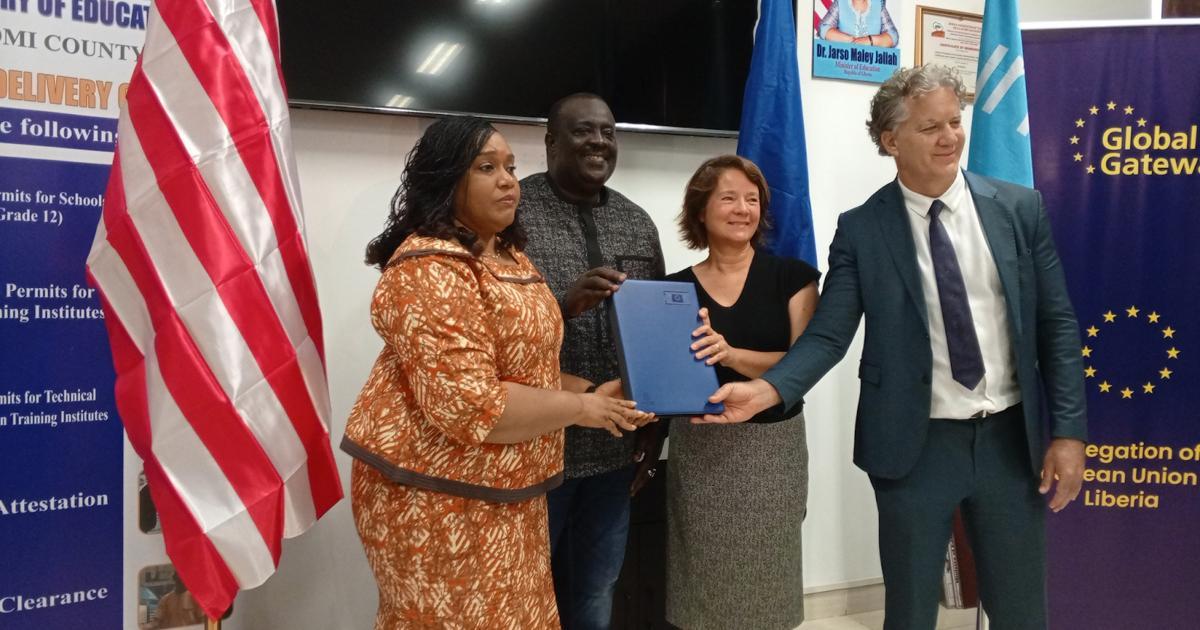Africa-Press – Liberia. In a move to transform Liberia’s education landscape, the Ministry of Education has signed a US$2 million grant agreement with the European Union (EU) and UNICEF to strengthen the country’s Education Management Information System (EMIS). The agreement, celebrated at a formal signing ceremony in Monrovia, signals a renewed focus on data-driven decision-making and sustainable reforms in education.
The funding, provided through a collaborative partnership, is expected to significantly improve Liberia’s ability to collect, analyze, and utilize reliable education data—an essential step in enhancing learning outcomes for students across the country. The initiative will directly support the Ministry of Education’s EMIS Division and also benefit the Ministry of Youth and Sports, especially in the area of Technical and Vocational Education and Training (TVET).
Education Minister Jarso Maley Jallah hailed the agreement as a critical milestone in Liberia’s quest to build a modern, responsive education system.
“This agreement is more than a financial transaction—it is a reaffirmation of the value we all place on data that tells the real story of the state of our schools, teachers, staff, and administrators,” said Minister Jallah. “When we invest in data, we invest in better decisions. And when we make better decisions, our children and youth benefit the most.”
According to officials, one of the keys focuses of the grant is to close the information gap in TVET, a sector often overlooked in national data efforts. The initiative aims to build a complete picture of TVET across Liberia by tracking enrollment, graduation, employment outcomes, and resource allocation.
“TVET provides a crucial pathway to opportunity for thousands of young Liberians,” said a Ministry representative. “But to realize its full potential, we must first understand where the gaps lie and how to invest more strategically.”
EU Ambassador to Liberia, Nona Deprez, expressed pride in the EU’s longstanding commitment to Liberia’s education sector, revealing that over the past several years, the EU has invested over €50 million in TVET alone.
“We’re not just investing in infrastructure and students—we’re also prioritizing teacher training and school management,” Ambassador Deprez noted. “Partnering with UNICEF to support the Ministry of Education in strengthening EMIS is a natural next step. It allows us to track the real impact of our collective investments.”
She added that the EU, through its “Team Europe” approach, which includes contributions from member states, has committed approximately €100 million to support Liberia’s TVET sector. The partnership with UNICEF, she emphasized, will ensure that quality data is available to guide future policies and priorities.
Andrew Brooks, UNICEF Country Representative in Liberia, stressed that data and evidence are critical tools for driving lasting change.
“If you have reliable data, you have authority, credibility, and objectivity—and ultimately, the power to influence change,” Brooks said. “What we lack in the sector right now is consistent, credible information to help us tell a convincing story about what’s working and what’s not.”
Brooks highlighted persistent challenges facing Liberia’s education sector, including out-of-school children, gender disparities, and overage enrollment. He noted that a robust EMIS can help policymakers and development partners measure progress and invest more strategically.
“This initiative is not just about tracking TVET,” he said. “It’s about creating a data system that follows children from their first day of school through secondary and into vocational training—helping us understand, at every step, what interventions are making a real difference.”
The initiative also marks a stronger inter-ministerial collaboration between the Ministry of Education and the Ministry of Youth and Sports. Officials emphasized that a more coordinated and holistic approach is needed to tackle the systemic challenges in Liberia’s education and youth development landscape.
Brooks praised Education Minister Jallah for taking ownership of sector coordination, noting that the days of fragmented programming must come to an end.
“Even if we work collectively, the challenges are enormous. But if we work in silos, we’re guaranteed to fail,” he said.
In closing, Brooks applauded the Ministry of Education’s new leadership role under the African Union’s African Agenda for Industrial Development (AAID) in steering the Human Capital Pillar, saying it was a fitting recognition of the ministry’s central role in national development.
“Liberia has endured too much loss—war, Ebola, COVID—and now the World Bank tells us only one in three children will reach their full potential. That’s unacceptable,” Brooks stated. “This investment in EMIS is a step toward changing that narrative—so we can finally measure, and more importantly, achieve real progress.”
For More News And Analysis About Liberia Follow Africa-Press






